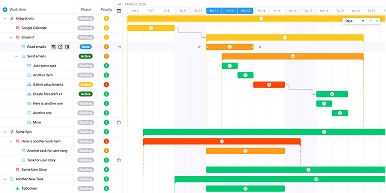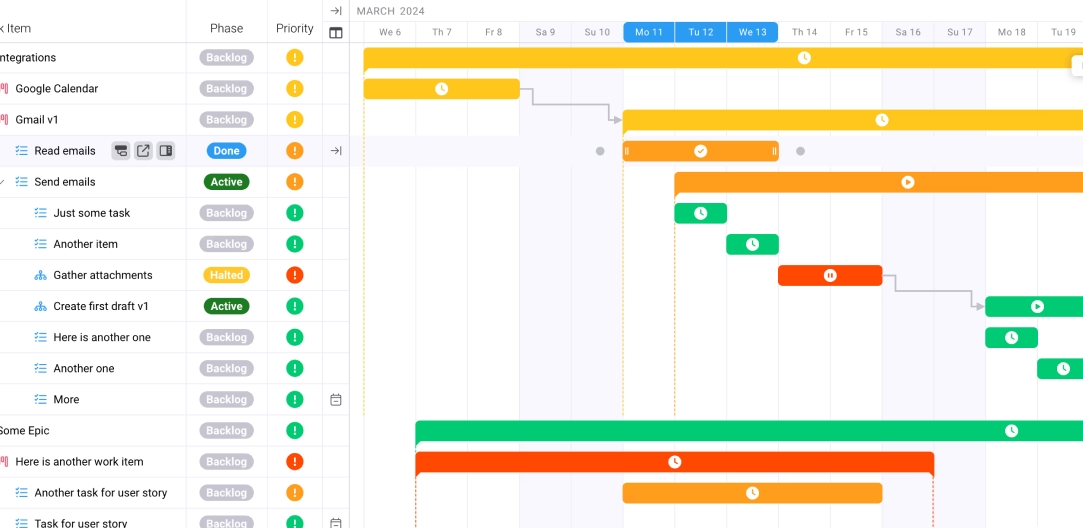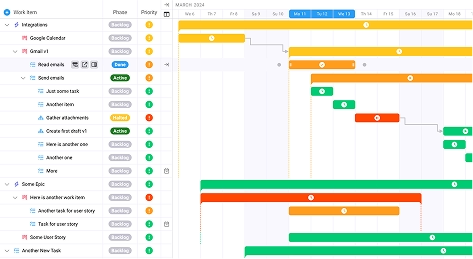
How CFOs Can Drive Business Value with a Single Work Management Platform
Key takeaways:
In today's hyper-competitive business landscape, CFOs face an unprecedented challenge: 41% of CFOs say 75% or more of their processes remain manual, consuming valuable time that could be spent on strategic decision-making. The traditional approach of managing financial operations through disconnected spreadsheets and legacy systems is no longer sustainable. Modern finance leaders are discovering that implementing a comprehensive work management platform isn't just about efficiency—it's about fundamentally transforming how their organizations achieve financial performance goals. This blueprint reveals how CFOs can leverage these powerful platforms to drive measurable financial improvements while positioning their organizations for sustainable growth.
The Current Challenge: What's Broken in Financial Operations
The financial operations landscape is riddled with inefficiencies that directly impact the bottom line. 64% of finance leaders say manual work leaves little time for strategic planning, creating a vicious cycle where teams are too busy managing day-to-day tasks to focus on value-adding activities. This operational burden manifests in several critical areas that demand immediate attention.
Consider the current state of financial consolidation and reporting. Bottom 25% of companies need at least 10 days for month-end close, while top performers complete the process in less than five days. This disparity represents more than just a time difference—it's a competitive disadvantage that affects decision-making speed, resource allocation, and ultimately, market responsiveness. When finance teams are bogged down in manual reconciliation and data validation, they can't provide the real-time insights that modern businesses require.
The cost implications are equally staggering. Manual invoice processing costs $15-$25 per invoice versus $2 with automation, representing a potential 90% reduction in processing costs. For organizations processing thousands of invoices monthly, this translates to hundreds of thousands of dollars in unnecessary operational expenses. These inflated costs compound across every manual process in the finance function, from expense management to budget tracking.
Beyond the direct costs, manual processes introduce significant risk factors. Human errors in data entry, delayed financial reporting, and inconsistent process execution create compliance vulnerabilities and decision-making blind spots. Finance teams operating without integrated work management systems often struggle with version control issues, where multiple team members work from different data sets, leading to conflicting analyses and recommendations. 63% of project professionals have seen considerable impact on their primary project when transitioning from manual to automated workflows, highlighting the transformative potential of proper system implementation.
The proliferation of disconnected point solutions further complicates the landscape. Finance departments typically juggle multiple specialized tools for different functions—one for expense management, another for project management, separate systems for time tracking and billing. This fragmentation creates data silos, increases integration complexity, and makes it nearly impossible to gain a holistic view of financial performance. The result is a reactive rather than proactive finance function, constantly playing catch-up instead of driving strategic initiatives.
The Strategic Framework: Reimagining Financial Operations Through Work Management
The transformation from fragmented financial operations to an integrated work management approach requires a fundamental shift in how CFOs conceptualize their technology stack. A comprehensive work management platform serves as the central nervous system of financial operations, connecting previously isolated processes into a cohesive, intelligent ecosystem. This isn't merely about digitization—it's about creating a strategic framework that aligns financial operations with broader business objectives.
At the core of this framework lies the principle of unified data architecture. When all financial processes flow through a single work management platform, data standardization happens automatically. Information from project timelines, resource allocation, expense tracking, and revenue recognition converges into a single source of truth. This convergence eliminates the reconciliation nightmares that plague traditional finance operations and enables real-time financial visibility that was previously impossible.
The strategic framework also emphasizes process orchestration over task automation. While individual task automation provides incremental benefits, true transformation comes from orchestrating entire workflows across departments. A modern work management platform enables CFOs to design end-to-end processes that span from initial project inception through final invoice collection, with automated handoffs, approval workflows, and exception handling built into the system. This orchestration ensures consistency, reduces cycle times, and provides complete audit trails for compliance purposes.
Integration capabilities form another pillar of the strategic framework. Work management platforms must seamlessly connect with existing financial systems, ERPs, and specialized tools. This integration layer acts as a universal translator, enabling data flow between systems without manual intervention. APIs, webhooks, and pre-built connectors transform the work management platform into a financial command center where CFOs can monitor, analyze, and optimize operations from a single dashboard.
The framework also prioritizes scalability and flexibility. As organizations grow and evolve, their financial processes must adapt accordingly. A properly implemented work management platform provides the configurability needed to accommodate new business models, regulatory requirements, and organizational structures without requiring complete system overhauls. This adaptability ensures that the initial investment continues delivering value as the business transforms.
Perhaps most importantly, the strategic framework recognizes that technology alone isn't sufficient. Success requires a comprehensive change management approach that addresses people, processes, and technology in equal measure. CFOs must champion a culture of continuous improvement, where teams are empowered to identify inefficiencies and propose solutions within the work management platform. This cultural shift transforms the finance function from a cost center to a value creation engine.
Implementation Tactics: Proven Strategies for Financial Transformation
Successfully implementing a work management platform for financial transformation requires a methodical approach that balances quick wins with long-term strategic objectives. CFOs who have successfully navigated this journey consistently emphasize the importance of starting with a clear implementation roadmap that prioritizes high-impact areas while building organizational buy-in.
The first critical tactic involves conducting a comprehensive process audit before selecting any technology. Map every financial workflow, from accounts payable to financial reporting, documenting current state inefficiencies, cycle times, and pain points. This baseline assessment provides the quantitative foundation for measuring improvement and helps identify which processes will benefit most from work management integration. Focus particularly on processes with high transaction volumes, multiple handoffs, or significant manual data entry requirements.
Begin implementation with a pilot program in a specific financial function rather than attempting enterprise-wide deployment immediately. Essential features for client service businesses often include time tracking, expense management, and project-based billing—areas where quick wins can demonstrate value. Select a pilot team that includes both technology champions and skeptics to ensure balanced feedback and broader acceptance. This controlled approach allows for iterative refinement before scaling across the organization.
Data migration and system integration require careful orchestration to maintain business continuity. Establish clear data governance standards before migration begins, including standardized naming conventions, data validation rules, and archival policies. Organizations using modern consolidation software reduce manual effort by up to 60%, but only when data quality standards are maintained throughout the implementation process. Create parallel run periods where both old and new systems operate simultaneously, allowing for validation and gradual transition.
Change management represents perhaps the most crucial implementation tactic. Develop a comprehensive training program that goes beyond basic system functionality to emphasize how the work management platform enhances individual roles and career development. Create role-specific training modules for different finance functions, ensuring relevance and engagement. Establish super-users within each team who can provide ongoing support and gather feedback for continuous improvement. Regular communication about implementation progress, early wins, and long-term vision helps maintain momentum through the inevitable challenges of organizational change.
Configure the work management platform to reflect your organization's unique financial processes rather than forcing process changes to fit system limitations. Modern platforms offer extensive customization capabilities through workflow builders, custom fields, and automation rules. Accounting firms transformation through work management demonstrates how customization can address industry-specific requirements while maintaining platform flexibility. Design approval hierarchies that mirror organizational structures, create custom dashboards for different stakeholder groups, and establish automated alerts for exception conditions.
Automation should be implemented incrementally, starting with low-risk, high-volume processes. Begin with simple automation rules like automatic invoice routing based on amount thresholds or vendor categories. As confidence grows, expand to more complex scenarios such as multi-level approval workflows, automatic accrual calculations, or dynamic budget reallocation based on project performance. Each automation should include exception handling procedures and manual override capabilities to maintain control while reducing routine workload.
Integration with existing financial systems demands careful attention to data synchronization and error handling. Establish clear integration patterns that define data flow direction, update frequency, and conflict resolution procedures. Real-time integration may not always be necessary or cost-effective; batch processing during off-peak hours often provides sufficient timeliness while reducing system load. Implement robust error logging and notification systems to quickly identify and resolve integration issues before they impact financial operations.
Measuring Success: KPIs and Metrics That Matter
The true value of a work management platform in financial operations becomes evident through carefully selected and consistently monitored key performance indicators. CFOs must establish a comprehensive measurement framework that captures both operational improvements and strategic value creation, ensuring that the platform investment delivers quantifiable returns while supporting long-term organizational objectives.
Financial close cycle time serves as a fundamental metric for platform effectiveness. 76% of CFOs expect digital transformation and technologies to play a greater role in 2024, with faster financial closes being a primary driver. Track not just the total days to close, but also the time required for each sub-process: data collection, reconciliation, adjustment posting, and report generation. Successful implementations typically show 30-40% reduction in close cycle time within the first year, with continued improvements as teams optimize workflows within the platform.
Cost per transaction metrics provide direct evidence of operational efficiency gains. Monitor the fully loaded cost of processing invoices, expense reports, journal entries, and other routine transactions. Include both direct labor costs and overhead allocation to capture true process costs. Organizations implementing comprehensive work management platforms typically see transaction costs decrease by 40-60% through automation and process optimization. These savings directly impact the bottom line and free resources for strategic initiatives.
Accuracy and error rates represent critical quality metrics that affect both operational efficiency and compliance risk. Track error rates in data entry, reconciliation discrepancies, and adjustment frequencies. A well-implemented work management platform should reduce error rates by 70-80% through automated validation rules, standardized processes, and elimination of manual data transfers. Lower error rates translate to reduced rework, faster audits, and improved stakeholder confidence in financial reporting.
Resource planning effectiveness can be measured through utilization rates and capacity planning accuracy. Monitor how effectively finance team members allocate their time across strategic versus operational activities. The goal is to shift resource allocation from routine tasks to value-adding analysis and decision support. Leading organizations report 25-35% increase in time spent on strategic activities after implementing integrated work management platforms.
Revenue cycle metrics deserve special attention given their direct impact on cash flow and working capital. Track days sales outstanding (DSO), invoice accuracy rates, and collection effectiveness. Work management platforms that integrate project delivery with billing processes typically reduce DSO by 15-20% through improved invoice accuracy and faster dispute resolution. Monitor the percentage of invoices paid on first presentation versus those requiring follow-up or correction.
Budget variance and forecast accuracy metrics demonstrate the platform's impact on financial planning and analysis capabilities. SaaS recurring revenue model makes traditional financial metrics unsuitable, requiring more sophisticated tracking of metrics like monthly recurring revenue, customer acquisition costs, and lifetime value. Measure both the accuracy of initial forecasts and the speed of identifying and responding to variances. Successful implementations show 20-30% improvement in forecast accuracy through better data visibility and automated variance analysis.
Compliance and audit metrics provide crucial risk management insights. Track audit finding rates, compliance violation incidents, and time required for audit preparation. A comprehensive work management platform with built-in controls and audit trails should reduce audit findings by 50-60% while cutting audit preparation time by 40-50%. These improvements represent both cost savings and reduced business risk.
Future Considerations: Preparing for the Next Evolution
The landscape of financial operations continues to evolve at an unprecedented pace, driven by technological advancement, regulatory changes, and shifting business models. CFOs implementing work management platforms today must consider not just current requirements but also position their organizations for future capabilities and challenges. 89% of finance leaders are racing to automate their processes, signaling a fundamental shift in how finance functions will operate in the coming years.
Artificial intelligence and machine learning integration represents the next frontier in work management platforms. These technologies will move beyond simple rule-based automation to provide predictive analytics, anomaly detection, and intelligent process optimization. CFOs should select platforms with robust AI capabilities or clear roadmaps for AI integration. Future applications include automated financial forecasting based on historical patterns and market indicators, intelligent invoice matching that learns from past corrections, and predictive cash flow modeling that considers multiple scenarios simultaneously.
The convergence of financial and operational data will accelerate, requiring work management platforms to handle increasingly diverse data types and sources. Internet of Things (IoT) sensors, real-time market feeds, and unstructured data from communications will all need to be incorporated into financial analysis. Platforms must evolve to process this data tsunami while maintaining performance and reliability. CFOs should evaluate platform scalability not just in terms of transaction volume but also data variety and velocity.
Regulatory compliance will become increasingly complex and dynamic, requiring platforms that can adapt quickly to new requirements. Environmental, social, and governance (ESG) reporting, real-time tax compliance, and cross-border regulatory harmonization will demand sophisticated tracking and reporting capabilities. Financial management and budgeting strategies must evolve to incorporate these new compliance dimensions while maintaining operational efficiency.
The shift toward continuous accounting and real-time financial reporting will eliminate traditional period-end closes in favor of perpetual financial visibility. Work management platforms must support this transition by providing real-time consolidation, automated inter-company eliminations, and instantaneous financial statement generation. This evolution requires robust data governance, sophisticated access controls, and audit capabilities that can handle continuous rather than periodic validation.
Blockchain and distributed ledger technologies may fundamentally alter how financial transactions are recorded and verified. While still emerging, these technologies promise to revolutionize areas like supply chain finance, inter-company transactions, and audit trails. Forward-thinking CFOs should ensure their work management platforms can integrate with blockchain networks as these technologies mature and gain adoption.
Ecosystem integration will expand beyond traditional financial systems to encompass entire business networks. Benefits of all-in-one platforms for service businesses include the ability to connect with client systems, vendor platforms, and industry-specific networks. This interconnectedness will enable real-time value chain optimization, collaborative forecasting, and automated multi-party reconciliation.
The workforce transformation toward hybrid and remote models requires work management platforms that support distributed teams while maintaining security and control. Project management costs range from 7-11% of total investment cost, making it crucial to optimize these investments for maximum flexibility and accessibility. Platforms must provide mobile-first experiences, asynchronous collaboration tools, and performance analytics that work across distributed teams.
Cybersecurity considerations will intensify as financial operations become increasingly digital and interconnected. Work management platforms must evolve to address sophisticated threats while maintaining usability. Zero-trust architectures, advanced encryption, and behavioral analytics will become standard requirements rather than premium features. CFOs must balance security requirements with operational efficiency, ensuring that security measures enhance rather than hinder productivity.
Conclusion
The transformation of financial operations through comprehensive work management platforms represents more than a technology upgrade—it's a strategic imperative for CFOs seeking to drive measurable financial performance improvements. As we've explored throughout this blueprint, the combination of integrated processes, automated workflows, and real-time visibility fundamentally changes how finance functions create value for their organizations. The evidence is compelling: from dramatic reductions in processing costs to significant improvements in close cycle times, organizations that embrace work management platforms position themselves for sustained competitive advantage.
The journey from fragmented, manual processes to an integrated work management ecosystem requires careful planning, methodical implementation, and ongoing optimization. Yet the rewards justify the effort. CFOs who successfully navigate this transformation report not only operational improvements but also a fundamental shift in their function's role—from reactive record-keeping to proactive strategic partnership. By following the strategies outlined in this blueprint and leveraging the power of modern work management platforms, finance leaders can unlock new levels of performance while preparing their organizations for the evolving demands of digital business.
The time for action is now. With the right work management platform and implementation approach, CFOs can transform their financial operations, reduce costs, improve accuracy, and most importantly, free their teams to focus on strategic initiatives that drive business growth. The blueprint is clear, the tools are available, and the benefits are proven. The question isn't whether to implement a work management platform, but how quickly you can begin realizing its transformative potential for your organization's financial performance.
Frequently Asked Questions
What is the typical ROI timeline for implementing a work management platform in finance operations?
Most organizations see initial returns within 6-9 months of implementation, with full ROI typically achieved within 12-18 months. The payback period depends on factors like organization size, implementation scope, and current process maturity levels.
How do work management platforms differ from traditional ERP systems?
While ERP systems focus on transaction processing and record-keeping, work management platforms emphasize process orchestration, collaboration, and workflow automation across departments. They complement rather than replace ERPs, providing the flexibility and user-friendly interfaces that ERPs often lack.
What are the biggest challenges CFOs face during work management platform implementation?
The primary challenges include change management resistance, data migration complexity, and integration with legacy systems. Success requires strong leadership commitment, comprehensive training programs, and phased implementation approaches.
Can small to mid-sized companies benefit from work management platforms as much as enterprises?
Absolutely. Smaller organizations often see proportionally greater benefits due to their ability to implement changes quickly and the significant impact of automating previously manual processes on lean teams.
How do work management platforms improve financial compliance and audit readiness?
These platforms provide automated audit trails, standardized processes, built-in controls, and real-time documentation of all financial activities, significantly reducing compliance risks and audit preparation time.
What skills should finance teams develop to maximize work management platform benefits?
Teams should focus on developing data analysis capabilities, process design thinking, and platform configuration skills. Understanding automation logic and integration concepts also becomes increasingly valuable.
How do you measure the success of a work management platform implementation?
Key metrics include reduction in close cycle time, decreased cost per transaction, improved forecast accuracy, increased team productivity, and enhanced stakeholder satisfaction scores.
What role does change management play in platform implementation success?
Change management is critical, often determining implementation success or failure. It requires clear communication, comprehensive training, stakeholder engagement, and ongoing support to ensure adoption and optimization.
How do work management platforms support remote and hybrid finance teams?
These platforms provide cloud-based access, real-time collaboration tools, standardized workflows, and performance visibility regardless of location, enabling effective remote work while maintaining control and security.
What emerging technologies will impact work management platforms in the next 3-5 years?
Artificial intelligence for predictive analytics, blockchain for transaction verification, advanced automation through RPA, and enhanced mobile capabilities will significantly evolve platform capabilities.









